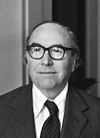1987 University of Oxford Chancellor election
| ||||||||||||||||||||||||||||||||||||||||
| ||||||||||||||||||||||||||||||||||||||||
| ||||||||||||||||||||||||||||||||||||||||
The 1987 University of Oxford election for the position of Chancellor was called upon the death of the incumbent Chancellor, Harold Macmillan, 1st Earl of Stockton, on 29 December 1986.
Electorate[]
The electorate consisted of all members of the University holding the rank of MA. Votes had to be cast in person at Oxford in academic dress. The election was by first past the post. To stand a candidate had to be nominated by two MAs.
Potential candidates[]
The forthcoming election generated much interest, and several names were raised in the press as potential candidates, including:[1]
- Retired Labour leaders Lord Wilson of Rievaulx (1916–1995) (Prime Minister 1964–1970 and 1974–1976) and James Callaghan (1912–2005) (Prime Minister 1976–1979)
- Former Conservative leaders Lord Home of the Hirsel (1902–1995) (Prime Minister 1963–1964) and Edward Heath MP (1916–2005) (Prime Minister 1970–1974), and the serving leader and Prime Minister Margaret Thatcher (1925–2013) (in 10, Downing Street, 1979–1990)
- Two other prominent Conservative politicians: former Foreign Secretary Lord Carrington (1919–2018) (held that position 1979–1982; a Cabinet minister in every Conservative government from 1956 until 1982), and Lord Hailsham of St Marylebone (Lord Chancellor 1970–1974 and 1979–1987; a former Conservative Cabinet minister since 1957)
- Social Democratic Party politicians Roy Jenkins (1920–2003) (Home Secretary 1965–1967 and 1974–1976; Chancellor of the Exchequer 1967–1970, Leader of the Social Democrats 1981–1983) and Shirley Williams (1930–2021) (Secretary of State for Prices & Consumer Protection 1974–1976; Paymaster-General & Secretary of State for education & Science 1976–1979) who had both broken away from Labour in 1981 due to its leftward drift.
All of the above had been educated at Oxford, apart from Lords Callaghan and Carrington.[1]
A notable feature of the election was the decision of the university establishment not to agree a preferred candidate in advance, thus increasing the possibility of a long list of candidates being nominated.[2]
Candidates nominated[]
Eventually four candidates were nominated:
- Lord Blake, a graduate from Magdalen College, student of Christ Church, Provost of Queen's College, and prominent historian of the Conservative Party
- Edward Heath, a graduate from Balliol College and former Conservative Prime Minister
- Roy Jenkins, also a graduate from Balliol, former Chancellor of the Exchequer, former President of the European Commission, and former leader of the Social Democratic Party
- Mark Payne, a general practitioner from Birmingham
Course of the election[]
The election attracted huge levels of publicity, at times likened to a parliamentary by-election.[3] Much of the attention focused upon the Jenkins and Heath campaigns, whilst Blake was seen as a non-political candidate. Payne was regarded as an outsider.
Much attention was focused on the issue of government funding for universities, with Oxford facing the effects of cuts in its funding, leading to several chairs being left unfilled.[4]
The requirement for those voting to do so in academic dress resulted in the local tailor selling out. One tactic of the supporters of Jenkins was to lend gowns to voters lacking them.[4]
Result[]
Polling ran until 14 March 1987. The results were as follows:[5]
| Candidate | Votes | % | |
|---|---|---|---|
| Roy Jenkins | 3,249 | 39.1 | |
| Lord Blake | 2,674 | 32.2 | |
| Edward Heath | 2,348 | 29.3 | |
| 38 | 0.5 | ||
| Turnout | 8,309 | ||
| Roy Jenkins elected | |||
See also[]
Notes[]
- ^ a b "Finding a dark blue horse". The Guardian. 10 January 1987.
- ^ "The buzz begins on an Oxford successor". The Guardian. 21 January 1987.
- ^ "Oxford's scholarly voters catch by-election fever". The Times. 8 March 1987.
- ^ a b "What a swell party this is ..And, by the way, we also elected a chancellor – The triumph of Roy Jenkins". The Times. 15 March 1987.
- ^ "Jenkins wins the Oxford vote". The Times. 15 March 1987.
- University of Oxford Chancellor elections
- 1987 elections in the United Kingdom
- 1987 in England
- 20th century in Oxford
- March 1987 events in the United Kingdom



